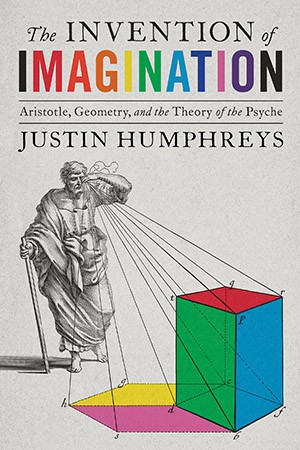Villanova University Philosophy Professor Justin Humphreys, PhD, Explores the Hidden History of the Mind in New Book

Villanova, Pa. — Why do we trust what we see, but not necessarily the images we conjure in our minds? What is imagination, really, and how does it influence our thinking? In his new book, The Invention of Imagination: Aristotle, Geometry and the Theory of the Psyche, Villanova University Philosophy Professor Justin Humphreys, PhD, explores the concept of imagination from its origins in ancient Greek philosophy to today.
In the early chapters of The Invention of Imagination, readers can expect a valuable introduction to pre-Socratic thought through an analysis of ancient Greek texts and early challenges with images. Dr. Humphreys examines the transition from geometric shapes in art to representations of the human body, raising questions about trust in perception.
“I argue that the concept of the imagination takes on this dichotomy; on one hand it can reflect reality, but it can also falsify and distort it,” explains Dr. Humphreys. Using that model, the second half of the book delves into Aristotle's theories on imagination, providing insights into ethics, the role of imagination in wishing and planning, and even the understanding of emotions like shame.
As a specialist in ancient philosophy, Dr. Humphreys emphasizes the ongoing relevance of philosophical texts and showcases the compelling views they offer. He also works to address a major challenge within the field—the technicality of scholarship—by presenting complex ideas in an engaging and accessible manner to a wider audience. Dr. Humphreys expresses his gratitude for Villanova's commitment to the liberal arts and hopes his work contributes to the vibrant intellectual community at the University and beyond.
With a background in classics and ancient Greek and Roman history, Dr. Humphreys began his career exploring the political implications of ancient texts. His transition to studying philosophy was marked by a commitment to understanding the mind's role in scientific knowledge, a theme central to his latest work. He teaches a range of philosophy topics within Villanova’s College of Liberal Arts and Sciences, including the history of ancient philosophy, Stoic and Epicurean philosophy, symbolic logic and graduate seminars for PhD students.
About Villanova University's College of Liberal Arts and Sciences: Since its founding in 1842, Villanova University's College of Liberal Arts and Sciences has cultivated knowledge, understanding and intellectual courage for a purposeful life in a challenging and changing world. With more than 40 majors across the humanities, social sciences and natural sciences, it is the oldest and largest of Villanova's colleges, serving more than 4,500 undergraduate and graduate students each year. The College is committed to a teacher-scholar model, offering outstanding undergraduate and graduate research opportunities and a rigorous core curriculum that prepares students to become critical thinkers, strong communicators and ethical leaders with a truly global perspective.
